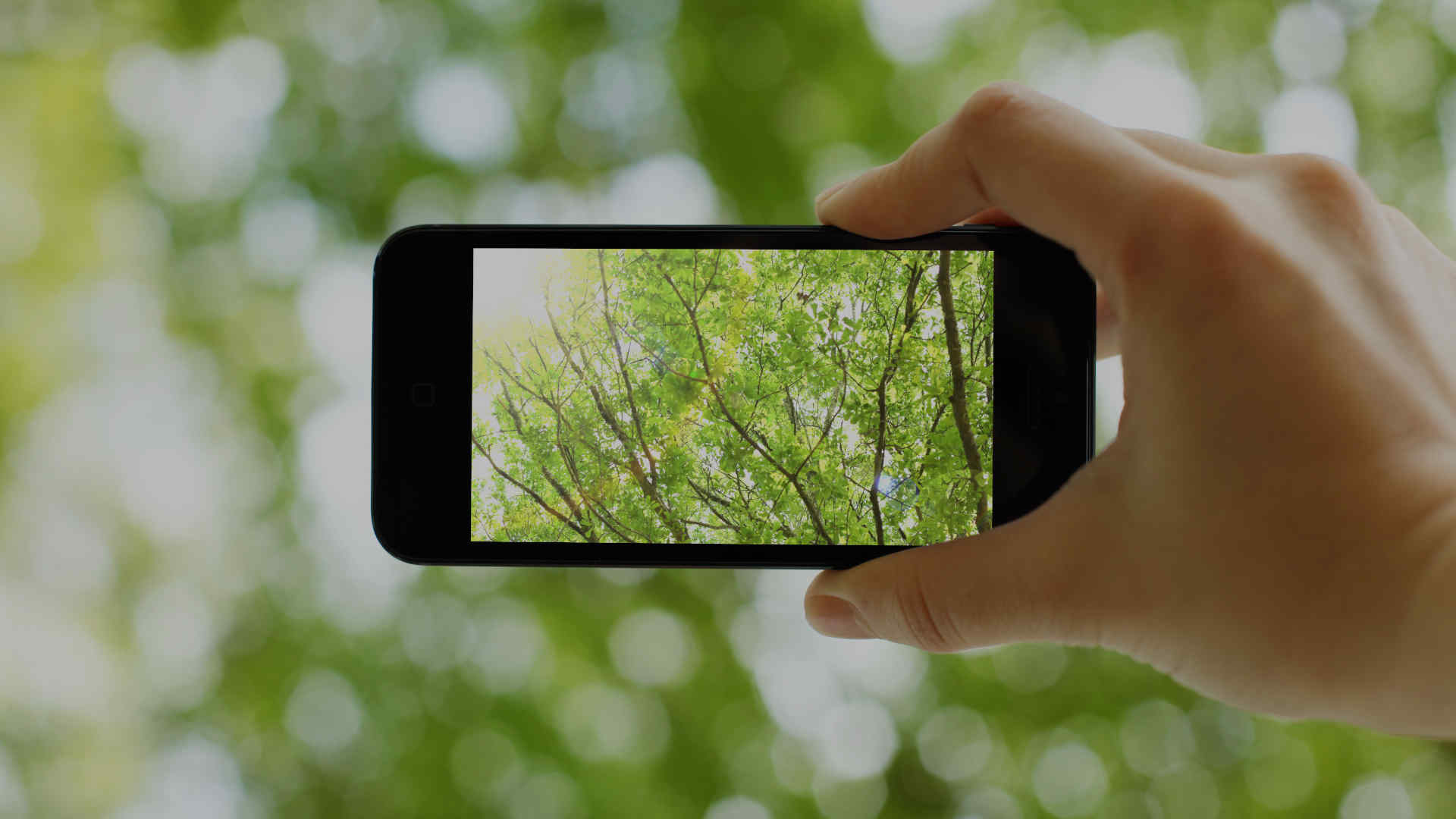
Liberalism and its disenchanted. How to defend and safeguard our liberal democracies.
Francis Fukuyama
On 5 September 2022, the Rafael del Pino Foundation organised the keynote lecture entitled "Liberalism and its Disenchanted. How to defend and safeguard our liberal democracies", given by Francis Fukuyama, Senior Fellow at the Freeman Spogli Institute for International Studies at Stanford University, on the occasion of the publication of his latest work of the same title published by Deusto.
The term liberalism has different connotations. In the United States it refers to more left-wing policies, more equality, more distribution, more government presence. In Europe it is just the opposite. People are more interested in the market, in private property rights and in limiting the size of public administration. Both definitions include liberalism in broader terms, because it has to do with several concepts. The first is the universality of human nature and thus the universal nature of human rights. Liberals believe that all human beings are equal in their capacity to make moral choices and governments are committed to respecting this autonomy by granting basic rights. Liberalism is underpinned by the rule of law, the rule of law. Governments cannot intervene in the vital decisions of human beings: where they live, what they believe, who they marry, what kind of work they do. The protection of autonomy is essential for a liberal government. If those rights are protected, even if it is a conservative or social democratic government, that is a liberal society.
What I want to defend is what I defend as classical liberalism, because it has been distorted, interpreted in a way that has led to attacks on liberalism.
There are three reasons why liberalism is superior in relation to social organisation. First, liberalism is a form that allows diverse societies to be governed. It began in the mid-17th century after the European wars of religion following the Protestant Reformation. One third of the European population lost their lives as a result of these wars. So European thinkers considered that perhaps something should be done with politics so as not to focus on religious doctrine. The protection of life is the important thing and one has to be able to agree to disagree with the ultimate goal. Everyone will be able to believe in whatever they want without anyone intervening in it. In the 19th and 20th centuries, there was no longer a discussion about religion, but about the concept of nationhood. There was talk of national identity, which claimed that one group was superior to other groups, which led to the two world wars. At the end of the two world wars, it is again recognised that a liberal world order that respects the freedom of all equally, that tries to reduce the distortions created by these assertions, which intolerantly defend national identity, is indispensable. That is how we created the world we have enjoyed for generations. It is a very pragmatic argument that defends society. It is better to treat everyone as individuals and equally than to base the system on the superiority of a particular group.
The second is the moral argument. Liberalism protects human dignity, which is based on human autonomy. Each of us can make moral choices. This fits into the Judeo-Christian tradition. Unlike the rest of the species, human beings understand the difference between good and evil and can choose good over evil. This ability to make moral choices ensures that each of us has this dignity, and is a foundation for a liberal society that respects human beings for this reason.
The third argument has to do with the economy. Among the rights it protects, liberal societies protect the right to private property, to business, to the economy. That is why these societies are among the richest in the world for protecting the right to do business, for example, the United Kingdom or the Netherlands. Other countries that have become rich have done so because they have adopted these principles, including China. China is not a liberal society, but it is a liberal society in the economic sphere. In 1978, Deng Xiao Ping established property rights. Chinese citizens can keep the results of their work and get rich quickly. Although it is not a liberal country in political terms, it is a liberal country in economic terms. If this were not the case, China's miraculous growth would not have happened.
But there are challenges we face. Attacks come from both the right and the left. The attacks from the right come from those who defend nationalism against liberalism, like Orban in Hungary, Modi in India, Trump in the United States, the various populist leaders like Salvini or Le Pen, who do not defend the rule of law that limits government, but a strongman who defends the people. These populists are elected, make the mandate their own and do not want to accept that limit, so they undermine the judiciary, the independent media, free political competition and democracy itself. This is done in the name of the supposed weakness of liberal societies, which do not refer to a single principle to define society.
In India there is a liberal regime created in the 1940's. It has diverse religions, regions, languages, castes. It is difficult to see how such a diverse society can coexist peacefully except in a liberal society. But the BJP, Modi's party, is trying to transform this identity by moving towards Hinduism. So India's 200 million Muslims are not part of this national identity. This is what paves the way for violence. Orban has defined Hungarian national identity on the basis of Hungarian ethnicity, excluding those who do not belong to it. This makes it possible to understand the advantages we enjoy in a liberal society.
The threat is that liberal society is in decline. There was an explosion in the 1970s that spread around the world, culminating in the fall of the Berlin Wall. These democracies going back to the early 1970s numbered over a hundred, but since the beginning of the 21st century this has been in decline. Freedom House, which monitors democracy around the world, defines this as a democratic recession, which, moreover, is qualitative because it is occurring in the world's largest democracies: the United States and India, which have seen populist leaders elected.
There is also a threat coming from left-wing populism, because societies are not reducing inequalities as they would like to, taking care of the marginalised. They want a stronger administration that is also not constrained by the rule of law. Right now, in Latin America, there is the rise of left-wing leaders, like Colombia or Chile, who have elected left-wing leaders who advocate an increased role for government in addressing these inequalities. They say that liberalism is outdated because it is not advancing fast enough.
This happens because of two deformations of liberalism, which have occurred in the last two decades, and which have resulted in negative responses on the right and on the left. On the right we would speak of neoliberalism, which is not synonymous with capitalism. We cannot think of a modern society without private property. Neoliberalism is a doctrine, rooted in the 1980s and 1990s, that idealises the market as the solution to virtually all public dilemmas and sees the state as anti-growth. There have been many economies in the 1970s that have had too much regulation, there have been too many public enterprises that were not efficient. So there was a response in the opposite direction, in my view too much, towards deregulation of markets. Some of this was necessary, but in the financial sector it led to a lot of economic instability from the 1990s onwards when these policies were implemented. This culminated in the subprime mortgage crisis in 2008, with many other financial crises in Asia and other parts of the world. It resulted in a globalised world in which inequality grew, and grew fastest in the most liberal countries. That inequality gave rise to the populist politics on the right and left that we have seen in recent years, because many workers in rich countries did not share in that prosperity. Many of their jobs moved to Asian countries, causing many problems for the countries that had adopted those policies.
The other deformation of liberalism has occurred on the progressive left with identity politics. There are different types and forms of identity politics, which are compatible with liberalism as a way of mobilising populations that have been marginalised, such as African-Americans, who called for an end to segregation. With them, liberalism's promise of equality had so far not been fulfilled. There is a liberal identity politics that says that the identity a person is born with, their race, gender, creed, sexual orientation is the most important thing about a person, more important than who you are as an individual. The state is going to take that identity as the way it is going to deal with the person. But left-wing identity politics begins to undermine liberalism. In the US, WOKE has created a very important division around who should be privileged. Should you privilege people who fall into this category, or should you privilege individuals on a case-by-case basis? If you don't express the progressive political opinion that you think is right, you can lose your job, or be criticised on social media. So we have one attack on right-wing liberalism and another on left-wing liberalism.
In the United States, the attack on liberalism coming from the right is more serious than that coming from the left. The attack from the right has gone so far as to say that Biden has become president through electoral fraud and is preparing to turn it around in the next election if they are given the opportunity to do so. They represent a very clear danger. The attack from the left is less dangerous, it is more long-term, it has to do with whether the person sees themselves as an individual or as a member of a collective. That problem will exist for many years to come.
There are other issues that became very clear during the Covid-19 pandemic. They have to do with our cognitive capacity to deal with facts, information and truth. One of the things of classical liberalism is a cognitive mode that we call modern natural science. According to this way of thinking, there is an objective reality distinct from our subjective consciousness. We can understand that reality through experimental methods and therefore we can manipulate the outside world. This has laid the basis for the technological manipulation of the world, which has created the wealth we enjoy today. But there has been a critique of modern natural science, starting on the left and moving to the right, which is undermining the basis of our ability to agree on basic information and facts. The words we use to talk about reality shape that reality, imposing our subjective view on what we believe to be an objective world. In many ways, it gives rise to a relativism, that there is no objective reality out there. Foucault argues that modern natural science itself is not objective in its approach to reality; rather it reflects the interests of some hidden elites who use science to manipulate others. They need something subtle to manipulate and they use science to do so. Foucault took this to the extreme and began to argue that all natural science reflected these interests. If we say that there is no objective reality and that everything is the projection of the powerful, of their vision and their interests in the world, everything else is a matter of power politics. So why be on the side of the marginalised? Because it is simply projecting their power.
This trend started in the 1980s and 1990s, especially in universities, but has now reached the far right. All extreme right-wing groups put forward the same arguments during the Covid-19 pandemic. That health authorities who tell people to get vaccinated, to use masks, to keep their social distance, are scientists, but in fact they are acting in the interests of hidden elites who want to exercise power over people. So the idea that starts on the extreme left has now moved to the extreme right. This is dangerous because if in a liberal society we cannot agree on basic, empirical information, that society has a big problem because it will not be able to deliberate rationally and come to common decisions.
Liberals have a problem with the idea of nationhood, because they believe in the universality of human rights. Human rights have to be respected everywhere in the world. But the world is divided into nation states with limited jurisdictions. For many liberals this is a problem because rights mean nothing unless they can be enforced, and those who enforce them are states with their monopolies of power, which can make people enjoy their rights because they have the coercive power to force society to respect the rights of their compatriots. But states do not have the power to defend rights all over the world; they can only do so within their borders. That is why it is so important that we organise ourselves into nations. The European Union is an attempt to go further, but it has not achieved its purpose because there is no EU army or police force that can punish the violation of rights in a Member State. We are less willing to express solidarity the larger the group, but the nation is surely the largest group to which we owe solidarity, which is important for social cohesion, for the ability to make collective decisions. That is why it is difficult to eliminate national identity as a very important factor that makes liberalism possible. But that sense of national identity has to be liberal, because if it is based on a characteristic like race, which excludes part of the population, then it is not going to be the basis for collective action; it will be the basis for exclusion and for the domination of one group over another. What we need is a liberal collective identity, reflecting the common values, autonomy and equality of human beings.
In the last two generations, we in Europe and North America have lived in prosperous and peaceful societies. They were so because they accepted the international liberal order. But not everyone has accepted it. In addition to the populists, we have Russia and China, which have not accepted it and may challenge it. On 24 February we saw Russia's attack on a country that is a liberal society, Ukraine. Since 2014, Ukraine was struggling between a liberal democracy and a totalitarian state. The Russian aim in this war is to eliminate the possibility that a Slavic nation can be a successful democracy. That is the real challenge that Ukraine posed. At stake is that freedom and the whole European order that emerged after the fall of the Berlin Wall. That is what is at stake in this war. In that sense, the Ukrainians are fighting for their own freedom, but also on behalf of all of us. If Putin gets his way and takes control of all or part of Ukraine, undermining a viable state, there will be consequences. The other authoritarian leaders are paying attention and will learn about the strength of the democratic world's support for this democratic nation that they have tried to break through disinformation, weapons or other tools. I am quite optimistic about the Ukrainians' ability to stop Russia and defeat it, or to get them out of many regions they have occupied.
The Rafael del Pino Foundation is not responsible for the comments, opinions or statements made by the people who participate in its activities and which are expressed as a result of their inalienable right to freedom of expression and under their sole responsibility. The contents included in the summary of this conference are the result of the debates held at the meeting held for this purpose at the Foundation and are the responsibility of their authors.
The Rafael del Pino Foundation is not responsible for any comments, opinions or statements made by third parties. In this respect, the FRP is not obliged to monitor the views expressed by such third parties who participate in its activities and which are expressed as a result of their inalienable right to freedom of expression and under their own responsibility. The contents included in the summary of this conference are the result of the discussions that took place during the conference organised for this purpose at the Foundation and are the sole responsibility of its authors.
Latest frptv
-

The treasure of philanthropy: words and deeds that change the world
Pilar García-Ceballos, Mercedes Basso, Luciano Poyato, Marta Rey and Isabel Peñalosa
-
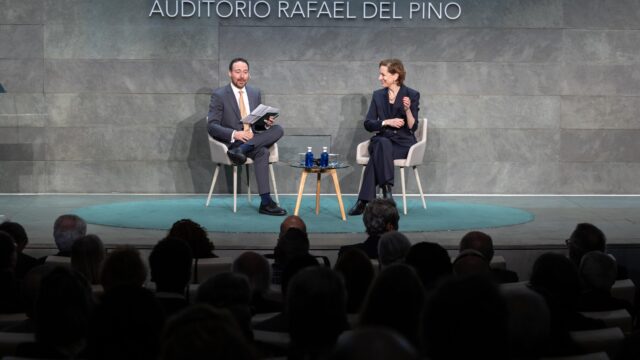
The new illiberal order: how the world is being reconfigured
Anne Applebaum and Federico Steinberg
-
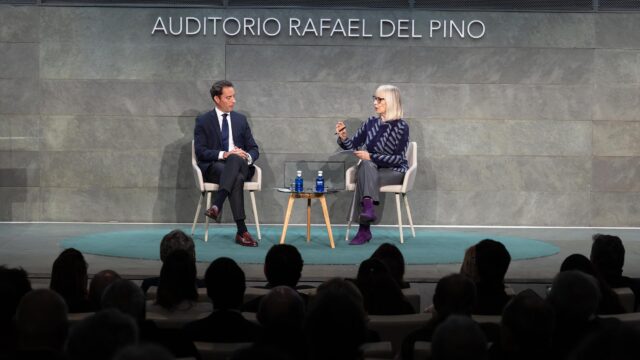
Shared challenges: The future of transatlantic security
Javier Colomina and Mira Milosevich
-
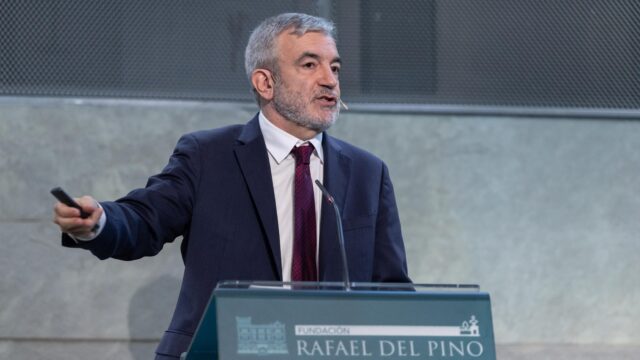
Pensioners versus the euro: how will the euro withstand the growing pressure on its
Luis Garicano
-
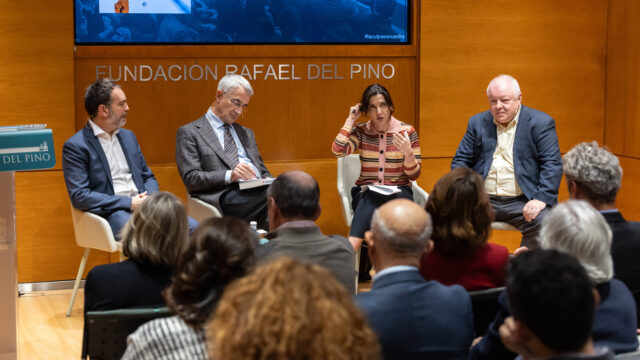
Is it our fault? How public preferences are holding back reforms in Spain
Ángel de la Fuente, Luis Miller, Benito Arruñada, and Maite Rico
-
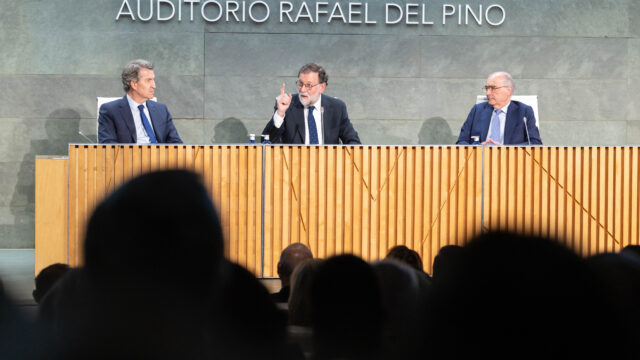
The art of governing
Dialogue between Mariano Rajoy, Benigno Pendás and Alberto Nüñez Feijóo
-
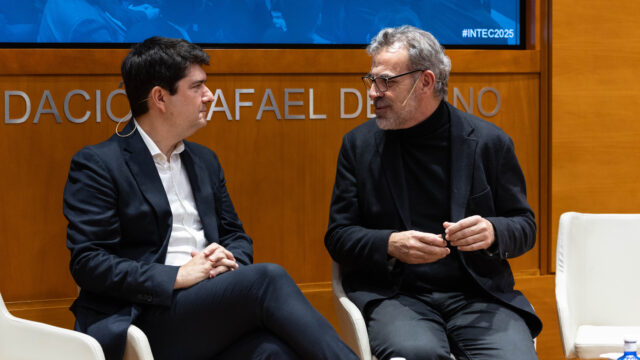
Presentation of the INTEC 2025 report
Javier García and Miguel Ángel Hoyos
-
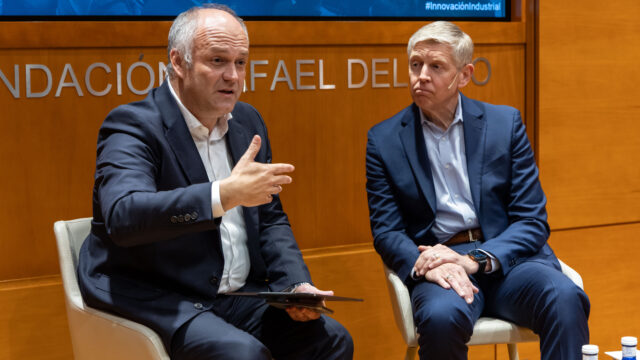
Industrial innovation, national defence and strategic independence
Lorin Selvy and Luis Pérez Breva

